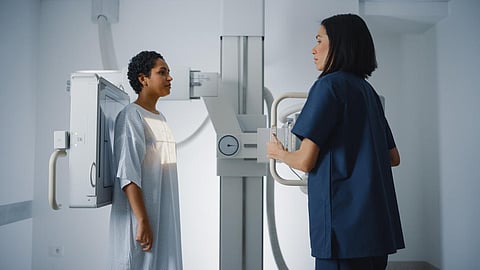TUESDAY, Oct. 8, 2024 (HealthDay News) -- Social risk factors are associated with decreased odds of receiving preventive services such as mammograms, Papanicolaou (Pap) tests, flu or pneumococcal vaccines, and colonoscopies, according to a study published online Oct. 4 in JAMA Network Open.
Tamara Schroeder, M.D., from the University of California, Davis, and colleagues examined the independent associations of social risk factor domains with preventive care services (routine mammography [women aged 40 to 74 years], Pap test [women aged 21 to 65 years], colonoscopy [adults aged 45 to 75 years], influenza vaccine [adults aged 18 years and older], and pneumococcal vaccine [adults aged 65 years and older]). The analysis included data from 82,432 individuals identified from the National Health Interview Survey (2016 to 2018).
The researchers found that all outcomes were associated with educational deficit (mammography: odds ratio [OR], 0.73; Pap test: OR, 0.78; influenza vaccine: OR, 0.71; pneumococcal vaccine: OR, 0.68; colonoscopy: OR, 0.82) and a lack of access to care (mammography: OR, 0.32; Pap test: OR, 0.49; influenza vaccine: OR, 0.44; pneumococcal vaccine: OR, 0.30; colonoscopy: OR, 0.35). Every unit increase in social risk count in an adjusted analysis was significantly associated with decreased odds of receiving a mammography (OR, 0.74), Pap test (OR, 0.84), influenza vaccine (OR, 0.81), pneumococcal vaccine (OR, 0.80), or colonoscopy (OR, 0.88).
"This study suggests that there is a need to address social risk factors to optimize receipt of recommended preventive services," the authors write. "Future prospective research studies are needed to investigate the underlying mechanisms of these associations."
Abstract/Full Text


